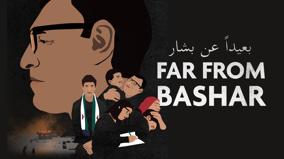Skip to content
Accessibility

New release
Coming
None
Waiting
1996
32 min
Leaving soon
This short documentary zooms in on the Dinka population of Alek, South Sudan, during a period of famine. The Dinkas are an extremely patient people. With empty stomachs, they await the next harvest. For the last 40 years, an intermittent state of civil war has divided the country in 2. This time, the population has requested aid. Sacks of grain are dropped from planes, but to prevent rioting, distribution is delayed until the arrival of reinforcements. During this week of waiting, we witness the true face of hunger.
This work deals with mature subject matter. Viewer discretion is advised.

This short documentary zooms in on the Dinka population of Alek, South Sudan, during a period of famine. The Dinkas are an extremely patient people. With empty stomachs, they await the next harvest. For the last 40 years, an intermittent state of civil war has divided the country in 2. This time, the population has requested aid. Sacks of grain are dropped from planes, but to prevent rioting, distribution is delayed until the arrival of reinforcements. During this week of waiting, we witness the true face of hunger.
This work deals with mature subject matter. Viewer discretion is advised.
-
directorMarie-Claude Harvey
-
narratorMarie-Claude Harvey
-
producerIolande Cadrin-Rossignol
-
photographyPhilippe FalardeauMarie-Claude Harvey
-
soundHannington Osodo
-
editingMichèle Hozer
-
sound editingMarie-Claude Gagné
-
re-recordingJean-Pierre JoutelJean Paul Vialard
-
musicMarco Giannetti
Ages 17 to 17
School subjects









![Food: Secret of the Peace [Discussion Trailer]](https://dkyhanv6paotz.cloudfront.net/live/fit-in/284x/medias/nfb_tube/thumbs_xlarge/2017/Food-secret-of-the-peace_trailer_XL.jpg)








